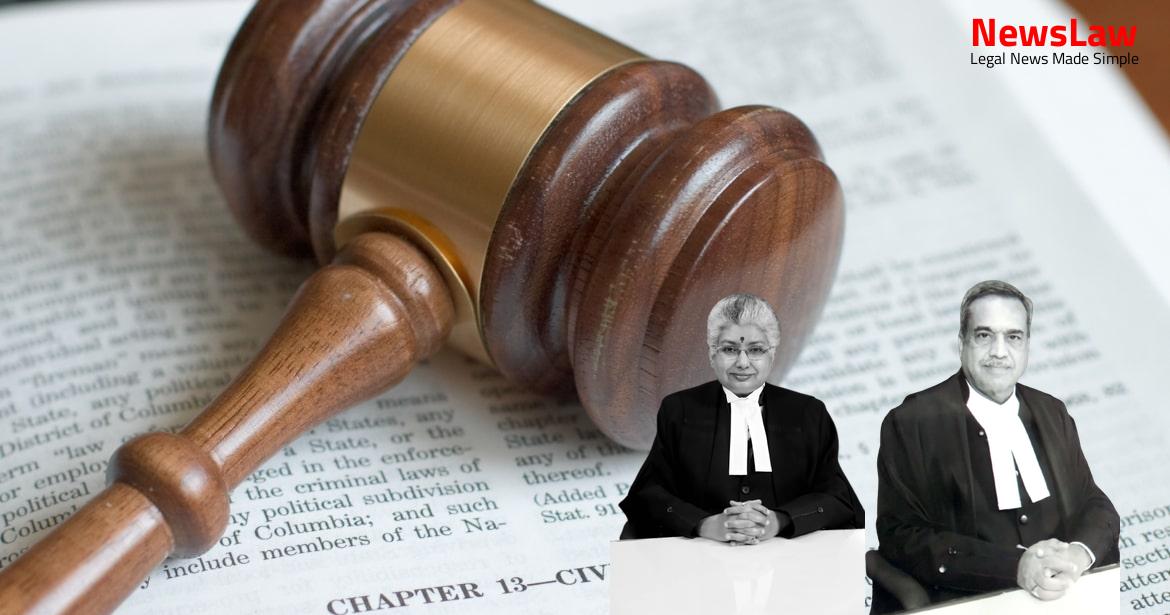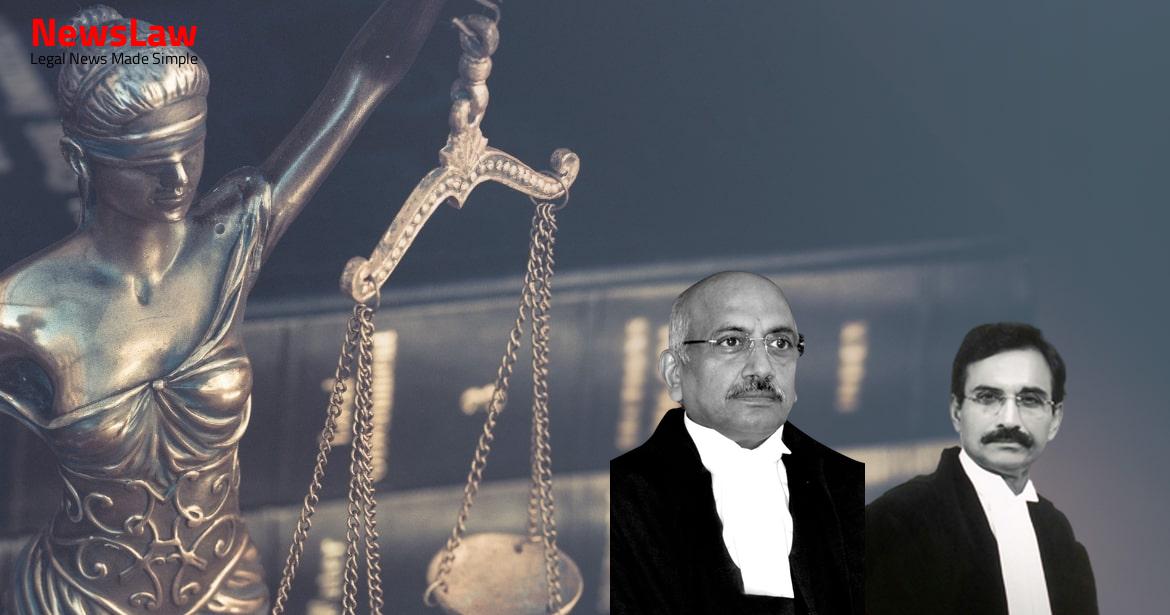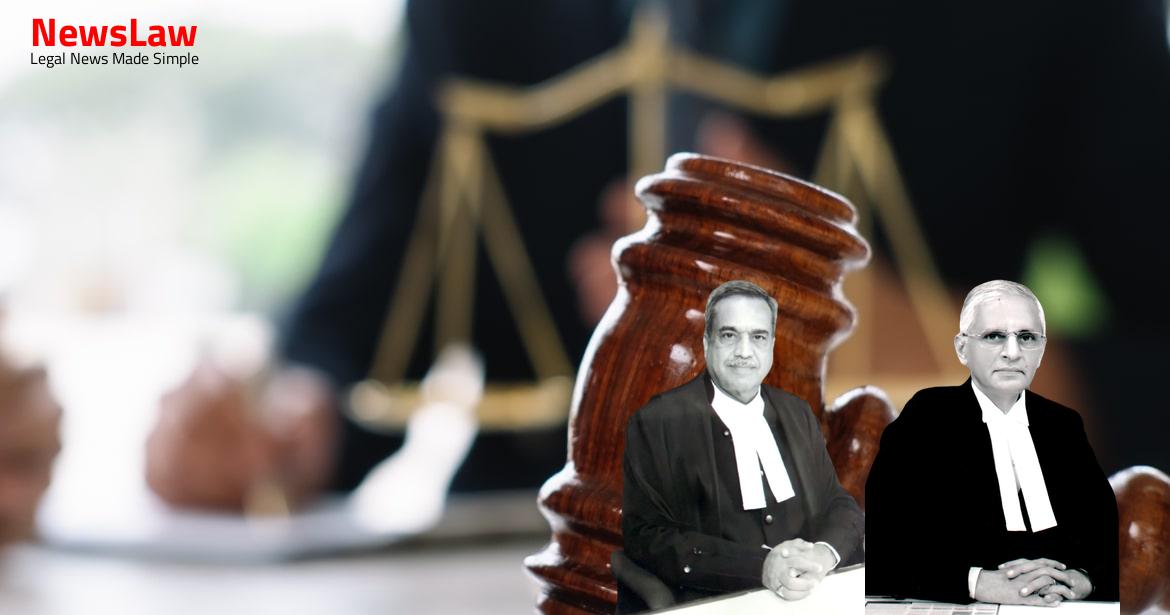Explore the detailed legal analysis by the court on the termination of an arbitrator’s mandate. The judgment discusses the application of relevant provisions in arbitration law, emphasizing the procedures for appointing arbitrators and grounds for challenging their appointments. It sheds light on the necessity of independence and impartiality in arbitral proceedings, offering insights into the court’s role in terminating an arbitrator’s mandate under specified circumstances. Stay tuned to unravel the complexities of arbitration law and the court’s legal scrutiny.
Facts
- The appellant filed an application under Order VII Rule 11 of CPC to dismiss the applications under section 14 of the Act, 1996.
- The Arbitrator adjourned the hearing on 30.03.2009 on the request of the parties.
- The Trial Court dismissed the application filed under Order VII Rule 11 of CPC by the appellant.
- The sole Arbitrator was appointed by the parties on 04.08.2008.
- Respondent No 1 and 3 revoked the mandate of the sole Arbitrator on 11.07.2009.
- Applications under section 14(1)(a) of the Act, 1996 were filed to terminate the mandate of the Arbitrator.
- The sole Arbitrator was not available on 30.03.2009, leading to no proceedings.
- The High Court terminated the mandate of the sole Arbitrator and appointed a fresh Arbitrator due to undue delay in the arbitration proceedings.
- The High Court also confirmed the Trial Court’s dismissal of the application under Order VII Rule 11 of CPC by the appellant.
- The High Court allowed Arbitration Case No 29/2015 due to undue delay by the sole Arbitrator.
- The Arbitrator’s mandate was terminated under section 14(1)(a) of the Act, 1996.
- A fresh Arbitrator was appointed by the High Court.
- The writ petitions challenging the Trial Court’s order were dismissed by the High Court.
Also Read: Ruling on Circumstantial Evidence in Murder Case
Issue
- The issue at hand is whether the High Court can terminate the mandate of a sole arbitrator under section 11(6) of the Arbitration and Conciliation Act, 1996.
- Another question is whether such termination can be done when there is no written contract containing the arbitration agreement.
- The third question is whether an application under section 11(6) is maintainable when the parties themselves appointed a sole arbitrator with mutual consent.
- The relevant provisions of the Act, 1996 regarding termination of the arbitrator’s mandate and the procedure to be followed are cited.
- The Act specifies procedures for appointment of arbitrators, including in cases of parties failing to appoint an arbitrator within the specified time frame.
- The role of arbitral institutions designated by the Supreme Court or High Court in making appointments and the necessity for independence and impartiality of arbitrators are highlighted.
- The Act also clarifies grounds for challenging the appointment of an arbitrator based on independence and impartiality.
- Overall, the judgment delves into the legal framework governing arbitration appointments and the powers of the High Court in terminating the mandate of a sole arbitrator.
Also Read: Challenging Legal Presumptions in Negotiable Instrument Cases
Arguments
- Appellant is aggrieved by the termination of the mandate of the Arbitrator under section 14(1)(a) of the Act, 1996 by the High Court.
- Claim that there is no provision other than those in the Act, 1996 to terminate the Arbitrator’s mandate.
- Argument against the applicability of section 11(6) of the Act, 1996 due to the absence of a written contract with an arbitration agreement.
- Stress on approaching the ‘court’ as defined in section 2(e) of the Act, 1996 for remedies mentioned in section 14(1)(a).
- Contention that section 14(1)(a) should not have been applicable since there was no undue delay by the sole Arbitrator.
- Disagreement with the dismissal of the writ petitions and the confirmation of the Trial Court’s decision under Order VII Rule 11 of CPC.
- Argument that termination of the Arbitrator’s mandate can only occur as per the provisions of the Act, 1996 citing specific sections for reference.
- Distinction between section 11(5) and section 11(6) of the Act, 1996 emphasized.
- Pointing out that parties involved did submit applications under section 14(2) of the Act, 1996 while the section 11(6) application was pending.
- Assertion that no section 11(6) application is maintainable when parties have already appointed an Arbitrator.
- Section 14(1) of the Arbitration and Conciliation Act, 1996 states that the mandate of an arbitrator ‘shall’ terminate if unable to perform functions or causing undue delay.
- Termination of the arbitrator’s mandate and substitution by another arbitrator is automatic if the conditions of section 14(1) are met.
- Cases of ACC Limited v. Global Cements Limited and Union of India v. Uttar Pradesh State Bridge Corporation Limited have been relied upon for reference.
- At the stage of deciding an application under Order VII Rule 11 of CPC, only the application/plaint contents are considered and not the defense.
- The Trial Court rightly rejected the application under Order VII Rule 11 of CPC and refused to reject the application under section 14 of the Act, 1996.
- Original applicants have withdrawn their applications under section 14(2) of the Act, 1996.
- Counsel heavily relies on the decisions in the cases of Antrix Corporation Limited v. Devas Multimedia Private Ltd. and S.P. Singla Constructions Private Limited v. State of Himachal Pradesh and Anr. to support the submission that subsequent application under section 11(6) of the Act, 1996 is not maintainable once arbitration proceedings have been initiated.
- Opposition to the appeal is presented by learned counsels representing respondent No. 1 and respondent No. 2.
Also Read: Legal Analysis Critique in High Court’s Quashing Order
Analysis
- The legislation provides that disputes regarding the termination of an arbitrator’s mandate under section 14(1)(a) must be brought before the ‘court’.
- An application under section 11(6) of the Act is maintainable only when there is a written contract containing the arbitration agreement and agreed-upon appointment procedures.
- If the parties appoint an arbitrator by mutual consent without a written contract, an application under section 11(6) to terminate the arbitrator’s mandate is maintainable.
- Disputes on terminating an arbitrator’s mandate under section 14(1)(a) must be raised before the ‘court’ and cannot be decided through section 11(6) applications.
- The Court should determine if there was undue delay by the arbitrator in concluding proceedings before terminating their mandate.
- Applications under section 11(6) in the absence of a written agreement with an arbitration clause are not maintainable.
- There is a distinction between sub-section 5 and sub-section 6 of section 11 of the Act, indicating different procedures for appointment issues.
- The party must approach the ‘court’ in case of disqualifications or inability of the arbitrator mentioned in section 14(1)(a) for adjudication.
- The court must determine if the arbitrator is genuinely unable to perform their functions before terminating their mandate.
- The disclosure of termination of mandate by an arbitrator should be made in the specified form.
- The termination of mandate can occur if the arbitrator withdraws from office for any reason or by agreement of the parties.
- In case of termination of mandate, a substitute arbitrator should be appointed according to the rules applicable during the initial appointment.
- If an arbitral award is set aside, the Court may decide on the entitlement of fees to the challenged arbitrator.
- Failure or impossibility to act by an arbitrator can lead to termination of mandate and substitution by another arbitrator.
- Default of a party in the arbitration proceedings can lead to termination of proceedings.
- An arbitrator should disclose any circumstances affecting their ability to act to the parties in writing.
- A party can challenge an arbitrator for reasons discovered after the appointment.
- Certain persons falling under specified categories in the Seventh Schedule are ineligible to be appointed as arbitrators.
- The procedure for challenging an arbitrator can be agreed upon by the parties or determined by the arbitral tribunal.
- The termination of mandate of an arbitrator should be decided by the Court in case of a controversy.
- Any settlement reached during arbitration proceedings should be recorded in an arbitral award on agreed terms.
- An aggrieved party can approach the High Court for appointment of an arbitrator under specified circumstances.
- In the subsequent decision of this Court in the case of S.P. Singla Constructions Private Limited, it was observed that once the arbitrator had been appointed as per the agreement and the law, the arbitration agreement could not be invoked for a second time.
- Reliance was also placed on the decisions of this Court in the cases of ACC Limited and Uttar Pradesh State Bridge Corporation Limited, which emphasized that in case of specified eventualities mentioned in the Act, the mandate of the arbitrator would stand terminated.
- However, the question arises whether disputes regarding the termination of the arbitration mandate under section 14(1)(a) should be raised before the court defined in the Act or can be considered in an application under section 11(6) of the Act.
- The impugned judgment and order passed by the High Court is unsustainable
- The judgment is quashed and set aside
- If the mandate of the sole arbitrator is terminated due to undue delay, the arbitrator must be substituted
Decision
- The appeals are allowed and a fresh arbitrator must be appointed following the same procedure as before.
- If parties do not agree on the arbitrator, aggrieved party can approach the court for appointment under section 11(5) of the Act.
- If application(s) under section 14(2) are dismissed and mandate of sole arbitrator is not terminated, the sole arbitrator must conclude proceedings within nine months.
- Appeals against orders confirming rejection of application under Order VII Rule 11 of CPC are dismissed.
- Judgments in AC No 29/2015 and RP No 655/2017 are quashed and set aside.
- Court where application under section 14(2) was filed must consider it on its own merits within four months.
- Respondent Nos. 1 and 3 withdrew their applications under section 14(2) but they shall stand revived for substantial justice.
- Dispute regarding termination of sole arbitrator’s mandate under section 14(1)(a) shall be resolved.
Case Title: SWADESH KUMAR AGARWAL Vs. DINESH KUMAR AGARWAL (2022 INSC 517)
Case Number: C.A. No.-002935-002938 / 2022



